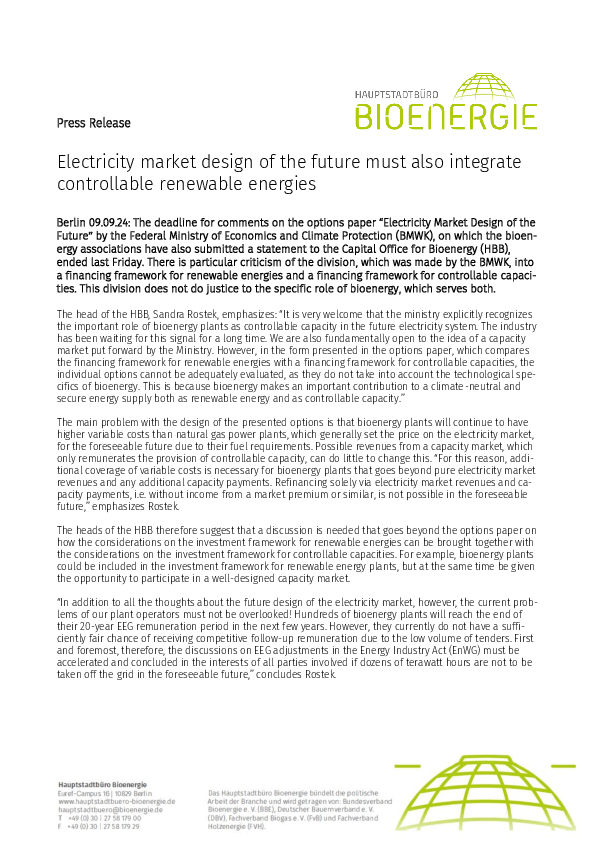The head of the HBB, Sandra Rostek, emphasizes: “It is very welcome that the ministry explicitly recognizes the important role of bioenergy plants as controllable capacity in the future electricity system. The industry has been waiting for this signal for a long time. We are also fundamentally open to the idea of a capacity market put forward by the Ministry. However, in the form presented in the options paper, which compares the financing framework for renewable energies with a financing framework for controllable capacities, the individual options cannot be adequately evaluated, as they do not take into account the technological specifics of bioenergy. This is because bioenergy makes an important contribution to a climate-neutral and secure energy supply both as renewable energy and as controllable capacity.”
The main problem with the design of the presented options is that bioenergy plants will continue to have higher variable costs than natural gas power plants, which generally set the price on the electricity market, for the foreseeable future due to their fuel requirements. Possible revenues from a capacity market, which only remunerates the provision of controllable capacity, can do little to change this. “For this reason, additional coverage of variable costs is necessary for bioenergy plants that goes beyond pure electricity market revenues and any additional capacity payments. Refinancing solely via electricity market revenues and capacity payments, i.e. without income from a market premium or similar, is not possible in the foreseeable future,” emphasizes Rostek.
The heads of the HBB therefore suggest that a discussion is needed that goes beyond the options paper on how the considerations on the investment framework for renewable energies can be brought together with the considerations on the investment framework for controllable capacities. For example, bioenergy plants could be included in the investment framework for renewable energy plants, but at the same time be given the opportunity to participate in a well-designed capacity market.
“In addition to all the thoughts about the future design of the electricity market, however, the current problems of our plant operators must not be overlooked! Hundreds of bioenergy plants will reach the end of their 20-year EEG remuneration period in the next few years. However, they currently do not have a sufficiently fair chance of receiving competitive follow-up remuneration due to the low volume of tenders. First and foremost, therefore, the discussions on EEG adjustments in the Energy Industry Act (EnWG) must be accelerated and concluded in the interests of all parties involved if dozens of terawatt hours are not to be taken off the grid in the foreseeable future,” concludes Rostek.
About the bioenergy associations
Four associations pool their expertise and resources in the field of energy policy in the "Main Bureau Bioenergy": the German Bioenergy Association (BBE), the German Farmers' Association (DBV), the German Biogas Association (FvB) and the German Wood Energy Association (FVH). Together they represent the entire bioenergy sector, from farmers and foresters, plant and machinery manufacturers, energy suppliers to operators and planners. The Bioenergy Capital Office gives the many different players and various technologies in the bioenergy industry a strong common voice in the political arena. Particularly in the electricity and heat sectors, it advocates the energy policy interests of its supporting associations across all technologies. In its contacts with political decision-makers, the Capital City Bioenergy Office can draw on a broad network of supporters and cooperates in particular with the German Renewable Energy Federation (BEE)

